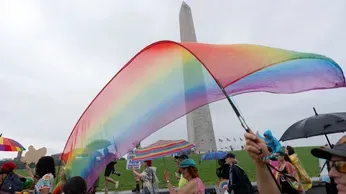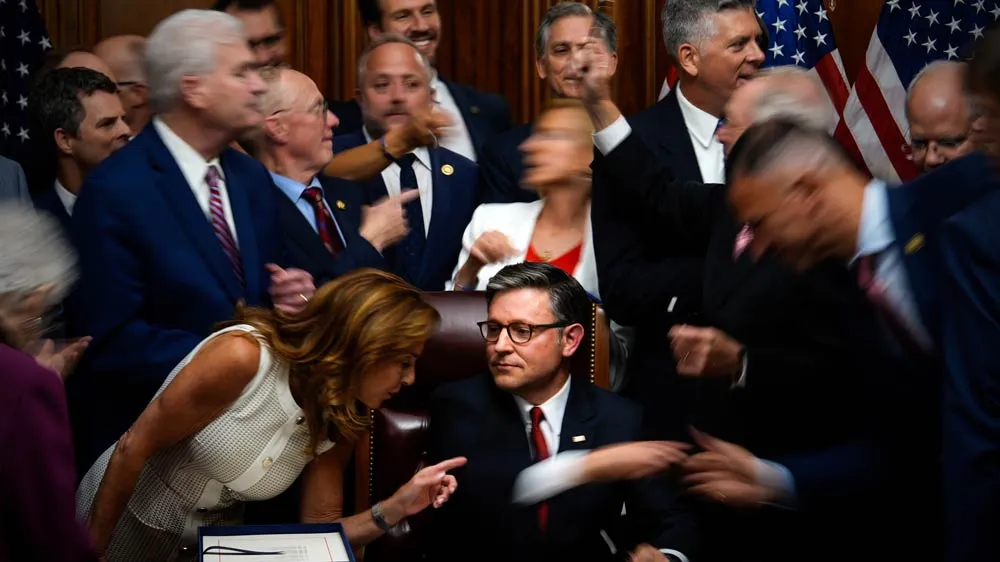
Jun 25
How US Adults' Views on Same-Sex Marriage have Changed Since the Supreme Court's 2015 Ruling
Linley Sanders READ TIME: 4 MIN.
For years, it looked as though the United States was steadily climbing toward a consensus on same-sex marriage. But 10 years after the Supreme Court ruled that there is a constitutional right to same-sex marriage, the split between Republicans and Democrats on the issue is wider than it's been in decades.
Recent polling from Gallup shows that Americans' support for same-sex marriage is higher than it was in 2015. Gallup's latest data, however, finds a 47-percentage-point gap on the issue between Republicans and Democrats, the largest since it first began tracking this measure 29 years ago.
The size of that chasm is partially due to a substantial dip in support among Republicans since 2023.
An Associated Press polling analysis shows how same-sex marriage shifted from a clear minority position to a stance with broad support – and what the future could hold for views on the issue.
Same-sex marriage was once highly unpopular
Less than 40 years ago, same-sex marriage was a deeply unpopular issue.
In 1988, The General Social Survey showed that just about 1 in 10 U.S. adults "strongly agreed" or "agreed" with a statement that gay couples should have the right to marry. At that point, roughly 7 in 10 Americans – including similar shares of Democrats and Republicans – disagreed with the statement.
But as early as the 1990s, the politics of same-sex marriage were shifting. Gallup data from 1996 – the year the Defense of Marriage Act defined marriage as between one man and one woman – showed that 27% of U.S. adults said marriages between same-sex partners "should be recognized by the law as valid." But Democrats and Republicans weren't in lockstep anymore: Democrats were nearly twice as likely as Republicans to support legal recognition of same-sex marriages.
Democrats' support for same-sex marriage shifted faster
By 2004, the legalization of same-sex marriage started to unfold at the state level. That year, Massachusetts became the first state to allow same-sex couples to marry. President George W. Bush, a Republican, championed a constitutional amendment to ban same-sex marriage on the campaign trail, while Democrats vying for their party's 2004 presidential nomination said the legalization of same-sex marriage should be left to the states.
At this time, Americans' support for same-sex marriage was still somewhat limited, and the divide between Republicans and Democrats deepened. About 4 in 10 U.S. adults agreed that same-sex marriage should be permitted, according to the Gallup data. Among Democrats, that agreement was higher – about half were in favor – compared with 22% of Republicans.
Since then, Americans' upward movement on support for same-sex marriage has been driven by Democrats and independents. Throughout Gallup's trend, Democrats have been more supportive of same-sex marriage than Republicans have. Since 2006, at least half of Democrats have supported same-sex marriage, and independents started to see consistent majority support in 2012.
The gap between Democrats and Republicans, meanwhile, stayed wide. By 2015, the year of the Supreme Court's ruling, about three-quarters of Democrats – but only about one-third of Republicans – supported same-sex marriage.
But Republicans did become somewhat more supportive of same-sex marriage between 2010 and 2020. While Democrats continued to lead the shift, Republican public opinion also moved during this decade – signaling a broader movement toward acceptance of same-sex marriage across party lines, even if it wasn't always linear.
Republicans' support for same-sex marriage dropped in recent years
About 7 in 10 Americans think marriages between same-sex partners should be recognized by the law as valid, according to Gallup data from this year, which is similar to the latest General Social Survey data showing 63% of U.S. adults agree that same-sex marriage should be considered a right.
But while the public's support for same-sex marriage ticked up in the years following the Obergefell v. Hodges ruling – from about 60% in 2015 – it has been relatively steady since 2020.
At the same time, Republicans' support has fallen in each of the past three years. Now, about 4 in 10 Republicans say marriages between same-sex partners should be recognized as legal, down from a record high of 55% in 2021 and 2022. This latest decline by Republicans returns their views to their 2016 measure, when 40% supported legal same-sex marriage.
Gallup Senior Editor Megan Brenan said Republicans' recent shift in opinion on same-sex marriage is dramatic.
"This was a much steeper fall from 2022 through 2025," she said. "And now, of course, we have the widest partisan gap that we've seen in the trends."
Younger and older Republicans split on same-sex marriage
Even as overall Republican support for same-sex marriage declines, a generational split within the party suggests that opposition may not hold in the long run.
Among Republicans under age 50, about 6 in 10 say same-sex marriages should be legally recognized, the Gallup poll finds. That stands in stark contrast to just 36% of Republicans over 50 who say the same –- suggesting that views on the issue could continue to shift.
Overall, younger adults are significantly more likely to support legal recognition of same-sex marriage. About 8 in 10 adults under 35 are in favor, compared with roughly 7 in 10 between ages 35 and 54 and 6 in 10 among those 55 or older.
Brenan noted that younger Americans are more accepting of same-sex marriage than older adults are, and it's an issue that especially appears to divide Republicans today.
"I think that's a key to where things will be headed, presumably," Brenan said. "Historically, people have become more conservative as they age, but this is an issue that's so ingrained in society today and especially younger society."







